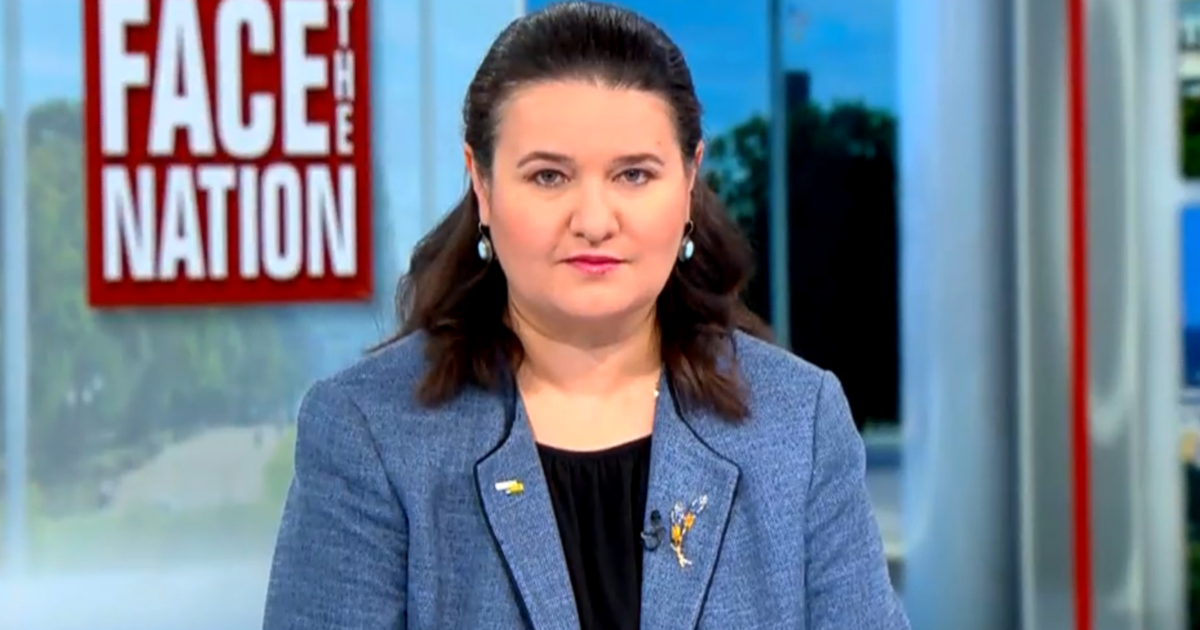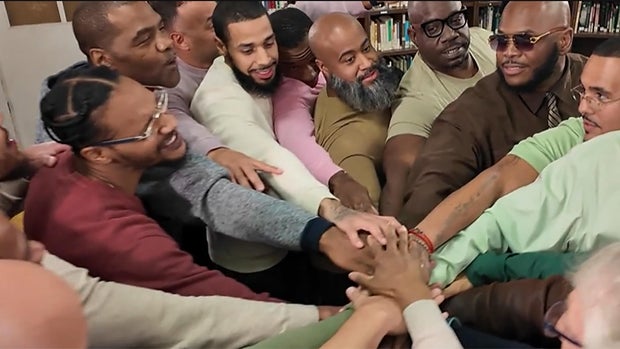CBS News
Rehabilitation Through the Arts: Breaking the cycle of incarceration

Sing Sing Correctional Facility is 40 miles and a world away from New York City. For almost 200 years, a grim monument to the theory that harsh discipline discourages former inmates from returning to a life of crime.
It’s a flawed theory. A national study by the Department of Justice found that 60% of former inmates are back behind bars within three years.
Which is what gives the movie “Sing Sing” such resonance.
Before he got a taste for acting, Clarence Maclin, who came to be known as Divine Eye, was a violent, knife-wielding, drug dealing inmate at Sing Sing. Now he’s appearing as a version of himself in the critically-acclaimed movie about a prison theater program. The movie stars Hollywood veteran Colman Domingo. in fact, 85% of the cast members in the film are what’s referred to these days as formerly incarcerated.
“I’m lovin’ the movie,” said Maclin. “I’m lovin’ the reaction, the acceptance, the way that people get it.”
“Well, it’s gotta be a big change for you,” I said. “You were always the outlaw, and now you’re the star.”
“Yeah, it’s a big change. It’s a beautiful thing.”
On a recent evening in November, we visited Sing Sing prison with Maclin and John Whitfield, the man he credits for his transformation. Whitfield, known as Divine G, was an award-winning author in prison and a founding member of Sing Sing’s theater program. Maclin said, “I’d probably still be in and out of prison, never would’ve changed my life, had it not been for this brother and his tenacity about getting me into the program.”
CBS News
According to Whitfield, getting Maclin into the RTA program (that is, Rehabilitation Through the Arts) took some doing: “But he eventually came around. And he came around and he experimented, and the minute he got on that stage and got bitten by the bug, I couldn’t shut him up!”
The two Divines, both out of Sing Sing for a dozen years now, returned as guests to meet with members of the current RTA class and a couple of civilian volunteers.
Perhaps nowhere in the world are the actual Divines better known and more widely admired than here.
The actors stood in a circle for a warmup exercise, and the Divines jumped right in. “It’s definitely about communication, about keeping eye contact,” Maclin said. “And we use that particular exercise so that when we’re on stage, we try not to step over everybody’s lines, so you gotta pay attention.”
The chant “chicken … fried … rice,” picked up by each of the participants ricocheted around the circle, faster and faster, until they break up in laughter. One man offered, “It helps you remember where you came from, ’cause all we had was chicken fried rice!”
CBS News
The laughter may be especially jarring to the victims of their crimes, or to the families of those victims. What (to put it more bluntly) does society get out of these RTA programs?
Here’s one answer: The staggering number of former inmates back in prison three years or less after their release – that 60% recidivism rate – is just 3% for those who stayed with the Rehabilitation Through the Arts program.
Divine G was involved with RTA back when success was still very much in question: “Some people’s looking at us like we had four heads. Are you crazy? Going on stage? Talking about ‘To be or not to be’? We didn’t force feed it that fast. You know we had to do it incrementally.”
None of it would have been possible without volunteers from the outside. Almost 20 years ago, Brent Buell volunteered long days at Sing Sing to direct the play that’s at the heart of the film. “Little by little, that getting into the character, [that] first step in empathy, and I’d see the guys eventually saying to one another, ‘What do you think your character feels?'”
Buell recalls what his actors wanted to play: “The guys said they wanted to do something with Robin Hood. They wanted something with Egyptians. They wanted something with the Old West. They wanted something with Freddy Krueger. They wanted something with gladiators.”
They wanted a comedy that didn’t exist. So, Buell wrote it for them over one long weekend, and called it “Breakin’ the Mummy’s Code.”
Buell recalls one particular breakthrough moment: “In the play, it takes place in the black plague, and the men have been dying. And Alotin Common, the Egyptian priest, says the bodies began to rot. And one of the men inadvertently let out a very … loud sound.”
In other words, he farted. “And the guys started to laugh. Well, then everybody was making, you know rotting noises and things. And they all had permission to be funny. And that was really a turning point in how the whole cast began to see that this is a comedy, and we can really have fun.”
I said, “Somehow, I don’t think this is going to convince America that we have a solution to our penal problems.”
“What’ll convince them is when they meet and are able to talk to the men, that developing of the trust, the respect, the empathy – those men are different people than they were,” Buell said.
He taped the original production, so that the men could share it with their families.
Brent Buell
This was back in 2005, and Brian Fischer, who was Sing Sing’s superintendent back then, recalls that some of his staff were a little skeptical: “All those guys up there carrying on? But as time goes by, the staff accepts them. And more importantly, the other offenders in the prison accept them. They become leaders. They become people that other people want to follow. And it changes the atmosphere and reduces the tension in a prison.”
Now retired, Fischer went on to become New York State’s Commissioner of Prisons. “I think over time, the fact that we were able to put it in other prisons, the fact that it was now acceptable – theater, arts, music [are] now acceptable in prisons that up ’til now didn’t want it.”
Prison life doesn’t normally encourage displays of emotion. RTA made that permissable. Demetrius Sampson told us, “I’ve been gone so long that I forgot what freedom felt like. But when I come to RTA, I felt free again. I left all the regrets and anxiety and mess-ups at the door. And I was able to come in and portray a character with freed-man problems.”
Tim Walker, a lifer, cites the role he played as Macbeth 13 years ago as a life-changing experience. “‘Come fate and champion me unto the utterance.’ That’s Macbeth. That’s the impact that RTA has had on me. That was the first time I ever touched a stage – someone convicted of murder, multiple felonies. I changed my life.”
Michael said, “The public sees us as the problem, and the RTA sees us as the solution.”
Clarence Maclin said, “I came here as an inspiration, to be inspiring to you, and I got inspired by you. Your humanity is monumental. You boys are giants in here.”
Nothing more or less than the promise that they can be something other than they were.
CBS News
For more info:
Story produced by Deirdre Cohen. Editor: Ed Givnish.
CBS News
Cindy McCain says hunger is a “national security issue” amid global conflicts

Cindy McCain, the executive director of the World Food Programme, said “hunger is at the forefront” of global conflicts worldwide, making it a “national security issue” that requires the help of all countries involved.
“We need help from everybody. The world is on fire right now,” McCain said on “Face the Nation with Margaret Brennan,” adding that “hunger is at the forefront of all of this.”
McCain outlined that with food insecurity, people don’t “behave well, and things — they start to migrate.”
“Wars begin that way,” she said. “Conflict is a part of all of this.”
Among the areas where the World Food Programme is at work is Syria, which has been thrown into a period of uncertainty after the fall of Syrian leader Bashar al-Assad last week. McCain said the organization’s deliveries to the area have been “very smooth” so far — with 70,000 people fed this month — while noting that they need more delivery options open, and more funds.
McCain said the World Food Programme has been able to move goods and food items to where they need to go “in a safe and quick manner” in Syria, noting that she’s hoping that things will “stay calm” so they can continue their work at full scale. But she said the organization is seeing “evidence of great hunger” in the country, while noting that without funding, people will “starve to death.”
McCain said the effort could use $17 billion worldwide, saying there are “so many countries that have absolutely no access to any fundings.”
“No one’s paying any attention to it,” she added.
McCain outlined the “complicated situation” in Sudan, with a slow process to access parts of the country, including places where famine has been declared. And in Gaza, she said conditions are “very close” to famine, noting that only two of the World Food Programme’s trucks were able to get through to the area in November.
Amid the access issues, McCain said “we need a ceasefire and we need it now,” adding that as the leader of the largest humanitarian aid agency in the world, she’s calling for a suspension of the hostilities in Gaza and urging her partners in the aid sphere to do the same.
“We can no longer sit by and just allow these people to starve to death,” McCain said. “We need help, and we need to make sure that we put political pressure on those that need to have political pressure put on them.”
CBS News
Transcript: Oksana Markarova on “Face the Nation with Margaret Brennan,” Dec. 15, 2024

The following is a transcript of an interview with Oksana Markarova, Ukrainian ambassador to the U.S., on “Face the Nation with Margaret Brennan” that aired on Dec. 15, 2024.
MARGARET BRENNAN: And we’re joined now by the Ukrainian ambassador to the United States, Oksana Markarova. Good to have you back with us.
UKRAINIAN AMBASSADOR TO THE U.S. OKSANA MARKAROVA: Thank you for having me and blessed Sunday to all.
MARGARET BRENNAN: No Western Power, as you know, is sending troops to Ukraine to help Ukrainian forces, but Russia’s got North Korean troops now who are fighting on their side. Yesterday, President Zelensky said Russia has been using a significant number of North Koreans. How are they fighting?
AMB. MARKAROVA: Yes, so and we are not asking for other troops. Ukrainians are still capable of defending our own country. We’re asking for the military support. Yesterday, we have seen those tens of thousands of troops that we were warning the word about. We have seen hundreds of them on the battlefield already, and we are successfully fighting with them as we are fighting with the Russians. I mean, look we we see them now in Kursk Oblast only, and our brave defenders were not only able to kill a lot of them, but also keep the positions. So it’s difficult, of course, to see the reinforcement from this axis of evil, but it will not change anything for us. We will continue defending the very long line, whether it’s in southern eastern Ukraine or whether it’s our defensive operation in Kursk.
MARGARET BRENNAN: And in the meantime, the North Korean troops are getting trained in Modern Warfare, and they’re learning in Ukraine- I mean, right there.
AMB. MARKAROVA: Absolutely. And we also have to worry about what is it that Russia is promising or even delivering to North Korea in exchange for this and Korean missiles.
MARGARET BRENNAN: But I also raised the manpower issue because it’s a problem for Ukraine as well. Military Recruitment is tough right now in Ukraine. There has been pressure on your government by the United States to lower the draft age so that you can boost the number of fighters. This is arguably a bigger issue than the weaponry itself. Is it affecting the ability of Ukraine to keep up this fight?
AMB. MARKAROVA: I wouldn’t agree that it’s a bigger issue than the equipment itself. We still have, first of all, we have a number of young people fighting for Ukraine, and they are volunteering, and women are volunteering. Ukraine is one of the countries that lifted all restrictions for women, for example, and we have 60,000 of women in the armed forces. With the recruitment, the last changes to the law on mobilization already allowed us to create new brigades, which we are training now. And the problem is to have enough equipment to train them on, so that we can actually not send to the battlefield like Russians do, right, unprepared, whether it’s North Korean to unprepared Russians, but to send soldiers who can do and deliver on a mission. And it’s very important for us, because every person matters for Ukrainians. Of course there are challenges, and we have the plan and we know how to do it, because again, this is our home we are defending. So when it’s necessary, all of us are going to be defending our country, but weapons and having more weapons, especially long range, especially something to counter this 3000 Glide bombs every month that Russians are sending against us.
There’s missiles for both Russian and North Korean missiles. I mean, it’s still a question of artillery and weapons and air defense, most importantly, and the more we can have, the faster we can- the more efficiently we can defend.
MARGARET BRENNAN: Well, the Biden administration has been releasing more weapons just in the last week alone. But Donald Trump gave an interview to Time Magazine, and he said the United States is escalating by allowing for weapons- missiles to be shot into Russian territory. He specifically focused in on that. He does not like that Ukraine is doing it. What does that mean for you on day one of the Trump administration?
AMB. MARKAROVA: Well, let me say, start by saying thank you to all American people, really, for standing with us all this time. Let me thank President Biden and his administration for all the support. Let me thank President Trump. He is the one who made a historic decision to provide us with Javelins, actually, to provide us with lethal aid in the first place–
MARGARET BRENNAN: –back in 2017.
AMB. MARKAROVA: Yes. So right now, we have to do everything in order to stop Russia. And we know it’s- it could be stopped. It was recently stopped in Syria. We liberated more than 50% that they have taken. We actually kicked them out from the Black Sea, just with our own naval drone capabilities. They could, they- we can stop them the more equipment we have, especially including the longer range equipment in order to be able to degrade the attack capabilities faster, the faster they will either come to the table, because, again, Ukraine wants peace. Nobody wants peace more than us. Ukraine was never a problem. We never initiated this conflict, and we negotiated at the first sign- remember, in 2022 when Russians started negotiations, they, of course, did not negotiate peace. They negotiated the pause. As we just heard Congressman Waltz, who absolutely rightfully said, it has to be peace, not a pause.
MARGARET BRENNAN: He was careful. He didn’t give a lot of specifics as to what the Trump policy will be but we do know that Viktor Orban was at Mar-a-Lago this past week, and he talks to Vladimir Putin, and he’s talking about a Christmas pause. Do you see a chance for a Christmas ceasefire and prisoner exchange?
AMB. MARKAROVA: This is very difficult winter, after Russia destroyed our- a lot of our energy infrastructure. And after you know, we are going through this difficult fights, both on the front line, but also civilians suffering from the deadly missile attacks–
MARGARET BRENNAN: –Just this past week.
AMB. MARKAROVA: Yes, at the same time, you know, every time Russia is talking about some ceasefire, they are lying. Russians are lying, and we see they were not able to defend their body- terrorist body Assad, and he fled to Russia. And we see horrible atrocities in Sednaya Prison, like we see in Ukraine everywhere. It reminded me isolation prison in Donetsk–
MARGARET BRENNAN: Right.
AMB. MARKAROVA: Which still is operational. So look, you know, if Russia wants seriously to stop it, they can stop it anytime.
MARGARET BRENNAN: Ambassador, I have to leave it there. Thank you so much for joining us.
AMB. MARKAROVA: Thank you.
MARGARET BRENNAN: We’ll be back in a moment.
CBS News
Full interview | Cindy McCain

Watch CBS News
Be the first to know
Get browser notifications for breaking news, live events, and exclusive reporting.





